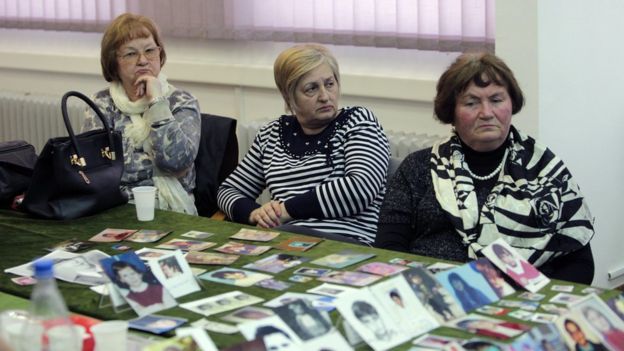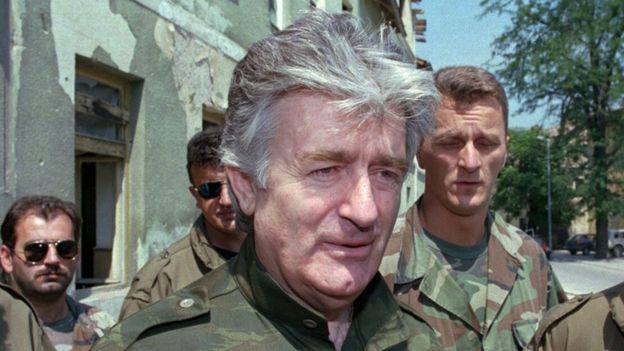Karadzic, 70, is the most senior political figure to face judgement over the violent collapse of Yugoslavia.
His case is being seen as one of the most important war crimes trials since World War Two.
He had denied the charges, saying that any atrocities committed were the actions of rogue individuals, not the forces under his command.
The trial, in which he represented himself, lasted eight years.
The current president of the Bosnian Serb Republic, Milorad Dodik, condemned the verdict.
"The West has apportioned blame to the Serbian people and that guilty cliche was imposed on all the decision-makers, including in this case today... Karadzic," he said at a ceremony to commemorate the anniversary of the start of Nato air strikes against Yugoslavia in 1999.
"It really hurts that somebody has decided to deliver this verdict in The Hague exactly today, on the day when Nato decided to bomb Serbia... to cause so much catastrophic damage and so many casualties," Mr Dodik added.
Karadzic verdict vital to Bosnia's future
Balkans war: a brief guide
Profile: Radovan Karadzic
Exploring the corridors of the Hague tribunal

"This came too late," said Bida Smajlovic, whose husband was killed at Srebrenica.
"We were handed down a verdict in 1995. There is no sentence that could compensate for the horrors we went through or for the tears of only one mother, let alone thousands," she was quoted as saying by Reuters news agency.
Karadzic's lawyer said he would appeal, a process that could take several more years.
"Dr Karadzic is disappointed and astonished. He feels that he was convicted on inference instead of evidence and will appeal [against] the judgement," Peter Robinson told journalists.
Karadzic faced two counts of genocide.
He was found not guilty of the first, relating to killing in several Bosnian municipalities.
But he was found guilty of the second count relating to Srebrenica, where Bosnian Serb forces massacred more than 7,000 Bosnian Muslim men and boys.
"Karadzic was in agreement with the plan of the killings," Judge O-Gon Kwon said.
The massacre happened in July 1995 when Srebrenica, an enclave besieged by Bosnian Serb forces for three years, was overrun. The bodies of the victims were dumped in mass graves.
Karadzic was also found guilty of crimes against humanity relating to the siege and shelling of the city of Sarajevo over several years which left nearly 12,000 people dead.
The judge said he had significantly contributed to a plan which emanated from the leadership and whose primary purpose was to spread terror in the city.
Charges
Genocide
- Count 1 - genocide (in municipalities of Bratunac, Foca, Klyuc, Prijedor, Sanski Most, Vlasenica and Zvornik) - not guilty
- Count 2 - genocide (in Srebrenica) - guilty
Crimes against humanity
- Count 3 - persecutions - guilty
- Count 4 - extermination - guilty
- Count 5 - murder - guilty
- Count 7 - deportation - guilty
- Count 8 - inhumane acts (forcible transfer) - guilty
Violations of the laws or customs of war
- Count 6 - murder - guilty
- Count 9 - terror (in Sarajevo) - guilty
- Count 10 - unlawful attacks on civilians (in Sarajevo) - guilty
- Count 11 - taking hostage of UN observers and peacekeepers - guilty
Mr Karadzic was also found guilty of orchestrating a campaign known as "ethnic cleansing" of non-Serbs from the territory of the breakaway Bosnian Serb republic, in which hundreds and thousands were driven from their homes.
He would only be expected to serve two-thirds of his sentence. His time spent in detention - slightly more than seven years - will count towards the total.
Top UN human rights official Zeid Ra'ad al-Hussein welcomed the verdict as "hugely significant".
He said the trial "should give pause to leaders across Europe and elsewhere who seek to exploit nationalist sentiments and scapegoat minorities for broader social ills".
At least 100,000 people in total died during fighting in the the Bosnian war. The conflict lasted nearly four years before a US-brokered peace deal brought it to an end in 1995.
Gen Ratko Mladic, who commanded Bosnian Serb forces, is also awaiting his verdict at The Hague.

- 1945: Born in Montenegro
- 1960: Moves to Sarajevo
- 1968: Publishes collection of poetry
- 1971: Graduates in medicine
- 1983: Becomes team psychologist for Red Star Belgrade football club
- 1990: Becomes president of Serbian Democratic Party
- 1990s Political leader of Bosnian Serbs
- 2008: Arrested in Serbia
- 2009: Trial begins at The Hague
- 2016: Guilty verdict, sentenced to 40 years
Were you affected by the war in Bosnia? Let us know about your experiences. Email haveyoursay@bbc.co.uk with your stories.
Please include a contact number if you are willing to speak to a BBC journalist. You can also contact us in the following ways:
- WhatsApp:
- +44 7624 800 100 (outside the UK)
- CLICK
Out of media player. Press enter to return or tab to continueMedia captionWhat happened at Srebrenica? Explained in under two minutes
No comments:
Post a Comment